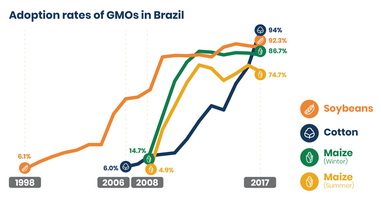Study: 20 Years of GM Adoption in Brazil Increased Farmers' Profits, Boosted Economy, and Preserved the Environment |
 In 2018, Brazil has completed 20 years since GMOs were adopted in agriculture. Throughout this period, what stands out are the benefits for farmers resulting from planting genetically modified (GM) soybeans, corn, and cotton. There has been, for example, a reduction in the application of pesticides per hectare and there have been fewer losses caused by pests. Consequently, the productivity and yield of the GM crops have been, on average, higher than conventional crops. The data is part of a study, 20 Years of GMOs in Brazil: Environmental, Economic, and Social Impacts, which was conducted by the Agroconsult consultancy with support from the Council for Information on Biotechnology (CIB Brazil). In 2018, Brazil has completed 20 years since GMOs were adopted in agriculture. Throughout this period, what stands out are the benefits for farmers resulting from planting genetically modified (GM) soybeans, corn, and cotton. There has been, for example, a reduction in the application of pesticides per hectare and there have been fewer losses caused by pests. Consequently, the productivity and yield of the GM crops have been, on average, higher than conventional crops. The data is part of a study, 20 Years of GMOs in Brazil: Environmental, Economic, and Social Impacts, which was conducted by the Agroconsult consultancy with support from the Council for Information on Biotechnology (CIB Brazil).
|
|
|
|
|
Sorghum's Weed-Killing Power Transferred to Rice |
 Scientists at the USDA Agricultural Research Service (USDA ARS) have transferred a biochemical pathway found in sorghum, which produces a weed-killing compound, into rice plants. Sorgoleone, a compound secreted by sorghum helps plants fight weeds and works so well that some other crops struggle to grow in fields planted with sorghum. Scientists at the USDA Agricultural Research Service (USDA ARS) have transferred a biochemical pathway found in sorghum, which produces a weed-killing compound, into rice plants. Sorgoleone, a compound secreted by sorghum helps plants fight weeds and works so well that some other crops struggle to grow in fields planted with sorghum.
|
|
|
|
|
|
|
Method for Production of Non-transgenic Gene-edited Plants, Developed for Cloned Plants |
 Transgenes that originally bear the CRISPR-Cas9 genome-editing complex are removed from desirable edited plants through sexual segregation. However, this method cannot be done in asexually propagated perennial plants, which require several years to reach sexual maturity. Thus, scientist Yi Li from Department of Plant Science and Landscape Architecture in Connecticut, USA, and colleagues developed a method for producing non-transgenic CRISPR-Cas9-edited plants without sexual segregation. Transgenes that originally bear the CRISPR-Cas9 genome-editing complex are removed from desirable edited plants through sexual segregation. However, this method cannot be done in asexually propagated perennial plants, which require several years to reach sexual maturity. Thus, scientist Yi Li from Department of Plant Science and Landscape Architecture in Connecticut, USA, and colleagues developed a method for producing non-transgenic CRISPR-Cas9-edited plants without sexual segregation.
|
|
|
|
|
|
|

|
A biweekly update on gene editing research, regulations, and impact
produced by ISAAA Inc. |
| |
|
|

|
| A monthly update on gene drive research and development provided by ISAAA in collaboration with the Outreach Network for Gene Drive Research |
| |
|
|
|
|
GM APPROVAL UPDATES |
- The Philippines approved the canola event LBFLFK for food, feed, and processing.
- The Philippines approved the cotton event GFM cry1A for commercial cultivation.
- Brazil approved the wheat event HB4 for commercial cultivation.
- The Philippines approved the soybean event GMB 151 for food, feed, and processing.
- The Philippines approved the eggplant event EE-1 for cultivation
- The USA approved the canola event MON94100 for food and feed.
|
|
|
|
| Biotech Updates is a weekly newsletter of ISAAA, a not-for-profit organization. It is distributed for free to over 22,000 subscribers worldwide to inform them about the key developments in biosciences, especially in biotechnology. Your support will help us in our mission to feed the world with knowledge. You can help by donating as little as $10. |
|
|
|
|